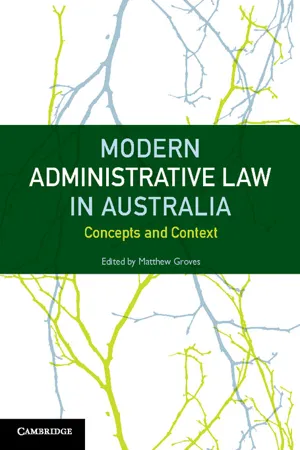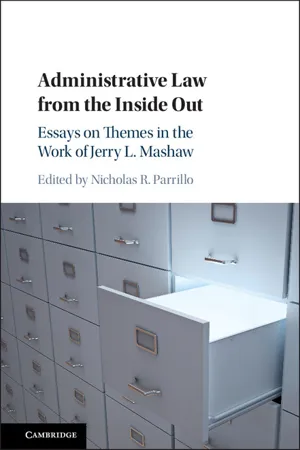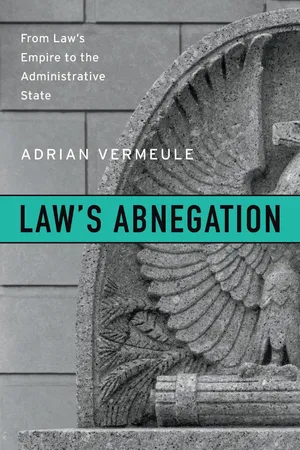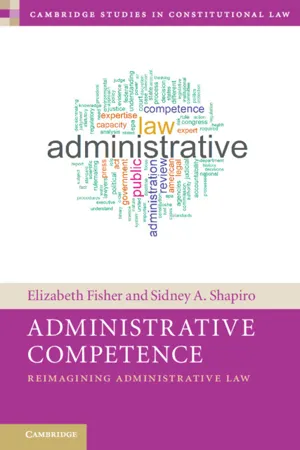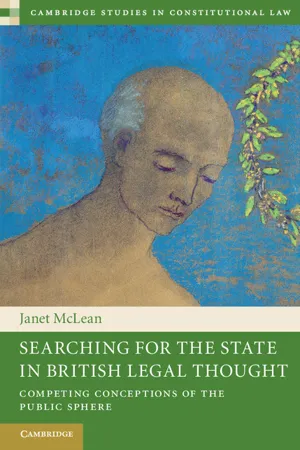Law
Administrative Law
Administrative law refers to the body of law that governs the activities of administrative agencies of government. It encompasses the rules, regulations, and decisions made by these agencies, as well as the legal principles that guide their actions. Administrative law also includes the process for challenging administrative decisions through mechanisms such as judicial review.
Written by Perlego with AI-assistance
Related key terms
1 of 5
10 Key excerpts on "Administrative Law"
- eBook - PDF
Modern Administrative Law in Australia
Concepts and Context
- Matthew Groves(Author)
- 2014(Publication Date)
- Cambridge University Press(Publisher)
Others place great emphasis upon rules that are designed to ensure that the administration effectively performs the tasks assigned to it. Yet others see the principal object of Administrative Law as ensuring government accountability, and fostering participation by interested parties in the decision-making process. 7 Wade and Forsyth take as the first approximation to a definition of Administrative Law the statement that ‘it is the law relating to the control of governmental power’. 8 There are, of course, a variety of mechanisms for the control of governmental 3 (1990) 170 CLR 1. 4 Ibid, 35–6. 5 M Aronson, B Dyer and M Groves, Judicial Review of Administrative Law (Lawbook, 3rd ed, 2004) 1. 6 P Craig, Administrative Law (Sweet & Maxwell, 7th ed, 2012). 7 Ibid, 3. 8 H W R Wade and C F Forsyth, Administrative Law (Oxford University Press, 10th ed, 2009) 4. Chapter 2: Themes and values revisited 27 1 power in a representative democracy. Judicial review is but one of them. Wade and Forsyth take as their second approximation that Administrative Law is ‘the body of general principles which govern the exercise of powers and discretions by public authorities’. 9 If the reference to ‘general principles’ is taken as a reference to ‘judicial principles’ then the second approximation falls within the scope of this chapter. It is the purpose of this chapter to offer an overview of the thematic and normative ideas in contemporary Administrative Law in Australia. If the exercise has any value, it lies in providing an occasion for reflection upon the nature of Administrative Law, the simplicity of the principles which underlie it and the desirability of their connection to widely held community values. Each of these themes, however, finds its place under the overarching concept of the rule of law which, in Australia, is supported by constitutional remedies against unlawful official action. - eBook - PDF
- Richard Mann, Barry Roberts(Authors)
- 2019(Publication Date)
- Cengage Learning EMEA(Publisher)
93 protection, consumer protection, regulation of transpor- tation, telecommunications, labor relations, trade, com- merce, and securities markets, as well as with providing health and social services. Because of the increasing complexity of the social, economic, and industrial life of the nation, the scope of Administrative Law has expanded enormously. In 1952, Justice Jackson observed that “the rise of administrative bodies has been the most significant legal trend of the last century, and perhaps more values today are affected by their decisions than by those of all the courts, review of administrative decisions apart.” This observation is even truer in the twenty-first century, as evidenced by the great increase in the number and activities of federal government boards, commissions, and other agencies. C HAPTER 5 In all tyrannical governments, … the right both of making and enforcing the law is vested in … one and the same body of men; and wherever these two powers are united together, there can be no public liberty. WILLIAM BLACKSTONE, BRITISH JURIST (1775) 1. Explain the three basic functions of administra- tive agencies. 2. Distinguish among the three types of rules pro- mulgated by administrative agencies. 3. Explain the difference between formal and informal methods of adjudication. 4. Identify (a) the questions of law determined by a court in conducting a review of a rule or an order of an administrative agency and (b) the three standards of judicial review of factual determinations made by administrative agencies. 5. Describe the limitations imposed on adminis- trative agencies by the legislative branch, the executive branch, and laws that require disclo- sure of information. Administrative Law A dministrative law is the branch of public law that is created by administrative agencies in the form of rules, regulations, orders, and decisions to carry out the regulatory powers and duties of those agencies. - eBook - PDF
- Hermann Pünder, Christian Waldhoff, Hermann Pünder, Christian Waldhoff(Authors)
- 2014(Publication Date)
- Hart Publishing(Publisher)
Conceptualizing Administrative Law 211 A. The Regulatory Approach: Administrative Law as a Legal Framework for a Governmental Pursuit of the General Welfare The regulatory approach focuses on goals established by the law. The law is seen as a means of behavioural regulation and as a medium for accomplishing context-appropriate tasks marked by questions of organization and procedure, and which is aware of its dependence on the cognitive dimension. In the cooperative state, private action is incorporated into the analysis and the goal is a comprehensive framework for problem-solving and government action in securing the general welfare. The primary interest under this approach is developing an appropriate governance structure, and the primary dialogue partners are the bureaucracy and the legislator. B. The Juristic Method: Administrative Law as a Means of Disciplining State Authority in Order to Secure Freedom The juristic method concentrates on the final state decision, the legal act, which is classified abstractly as a form of action which entails specific legal consequences. Legal acts and their consequences are ordered into a formal, consistent system. The main goal of this approach is to discipline the bureaucracy in the name of the rule of law, as seen from the external perspective of the citizen’s legal position. The goal is creating satisfactory legal protections for citizens. Thus, the primary dialogue partners are the courts. IV. THE ‘DEBATE’ AS A CROSSFIRE OF VARYING DISCOURSES The contrasting compilation of working methods in the concepts listed above is an expression of uncertainty and conflict, but also a precondition for reflection among scholars of Administrative Law. In the current debate over the various approaches, however, methodological questions are mixed with other discussions in which the personal lines of conflict are likely to run in similar directions. - eBook - PDF
Administrative Law from the Inside Out
Essays on Themes in the Work of Jerry L. Mashaw
- Nicholas R. Parrillo(Author)
- 2017(Publication Date)
- Cambridge University Press(Publisher)
These centralized issuances apply across the executive branch and direct, guide, and inform how agencies operate. They represent internal Administrative Law in a twofold sense: both as controls on agency action that emanate from within the executive branch and as requirements that force agencies to generate new internal processes, organization, and policy. Although such centralized and transsubstantive internal Administrative Law has expanded dramatically over the last few decades, its importance was recognized early on and fig- ured centrally in reform efforts leading to the Administrative Procedure Act (APA). 8 External Administrative Law has also changed significantly over time. When Wyman developed these distinctions at the beginning of the twentieth century, that law was primarily the standards and types of judicial review, and, in particular, the remedies that the common law provided a citizen for violation of her legal rights by administration. 9 With the growth of judicial controls over administration established through legislation and judicial review, however, external Administrative Law has become a broad set of controls imposed on agencies from outside the executive branch. Officers at iii (The Lawbook Exchange, Ltd. 2014) (1903). Although Wyman offered the most sustained account and defense of internal Administrative Law, other leading Administrative Law scholars of the time, in particular Frank Goodnow and Ernst Freund, similarly underscored its importance. See Gillian E. Metzger, Administrative Law, Public Administration, and the Administrative Conference of the United States, 83 Geo. Wash. L. Rev. 1517, 1524–26 (2015). 6 See Mashaw, Administrative Constitution, supra note 1, at 252–54; Wyman, supra note 5, at 185. 7 Wyman, supra note 5, at 4; Mashaw, Administrative Constitution, supra note 1, at 252. 8 See infra Section I. 9 Mashaw, Administrative Constitution, supra note 1, at 252–53; Wyman, supra note 5, at 9–13. - eBook - ePub
Law’s Abnegation
From Law’s Empire to the Administrative State
- Adrian Vermeule(Author)
- 2016(Publication Date)
- Harvard University Press(Publisher)
In the reconstruction I suggest, Hamburger offers a highly stylized constitutional vision derived from the English experience, interestingly crossbred with American high school civics—and also premised on a desperately shaky understanding of Administrative Law, or so I will argue. In this vision, legislatures hold the exclusive power to “legislate,” while judges exercise all “judicial” power and exercise independent judgment in the sense that they decide all legal questions for themselves, without “deference.” As for the executive, its only power is to “execute” the laws, understood very narrowly—basically the power to bring prosecutions and other court proceedings to ask judges to enforce statutes. The thing to avoid at all costs is that the executive should issue “binding” orders or rules; where that occurs, the executive is necessarily exercising “legislative” power and has arrogated to itself “extralegal” or “supralegal” prerogative, of the sort claimed by the Stuart monarchs in their most extravagant moments.When Hamburger says Administrative Law is “unlawful,” this, I think, is the way to understand him. He means, in other words, that American Administrative Law is out of step with the deep substantive principles of the small-c constitutional order of the Anglo-American legal culture. Administrative Law allows the executive to exercise “legislative” power by allowing agencies, and the President, to issue “binding” orders and rules, and in that sense allows the agencies a prerogative to act extralegally or supralegally, like the Court of Star Chamber.Administrative Law Is Lawful
Even given Hamburger’s reconstructed premises, Administrative Law is lawful. Above all, Hamburger fails to realize that law’s abnegation—especially in its most critical manifestations, evincing a relaxed approach to legislative grants of authority to agencies and judicial deference to agency interpretations of law—flows from law’s own internal logic. The central issue is delegation.The delegation issue hangs over the whole book. Hamburger’s basic charge, recall, is that Administrative Law rests on “prerogative” and is thus “extralegal.” Whatever that means exactly, it would become a far more difficult claim to defend to the extent that Administrative Law enjoys valid statutory authorization. If administrative agencies exercise whatever powers they possess under the authority of valid statutory grants, then they act lawfully in the ordinary sense. Now of course agencies may go wrong in other ways—for example, they may happen to exercise their delegated powers in an arbitrary and capricious manner—but that is not a wholesale problem with the administrative state, and it is not the sort of wholesale critique of the administrative state’s lawfulness that Hamburger wants to offer. - eBook - ePub
- Joanna Bell(Author)
- 2020(Publication Date)
- Hart Publishing(Publisher)
Lewisham Union Guardians, for instance, formed the view that it is inappropriate to issue a writ of mandamus to enforce a statutory duty enacted to benefit the public as a collectivity, as opposed to upholding the rights of an individual applicant to hold an office or a licence. In later case law, however, the courts developed the notion of representative standing which enables them to provide relief in cases precisely of this kind. This is not to say, however, that Administrative Law is concerned only with duties owed to the public at large, and that challenges are never concerned with the rights of individuals. As will be emphasised in the next chapter, such an understanding is overly simplistic. One reason for this is that the legislative schemes which sit in the background of Administrative Law challenges are not of one kind. Some frameworks, especially those in the social welfare context, purport to define the circumstances in which individuals acquire ‘rights’ or ‘entitlements’ to receive particular forms of treatment from administrative decision-makers.To summarise, this chapter has been concerned with the evolution of Administrative Law across the course of the twentieth century. This history is significant and interesting of itself. Furthermore, at least two important lessons of broader importance can also be drawn out from it. The first lesson is that Administrative Law in England and Wales has not developed in a neat and linear way. Administrative Law was not crafted at a particular moment in time to conform to an overarching logic. Its evolution, rather, has been both multifaceted and messy. The second lesson, and one reason for this, is that the legal structures in play in administrative adjudication are both complex and varied. Administrative Law challenges arise against an array of different legislative frameworks; the courts seek to accommodate a variety of different legal values and Administrative Law challenges concern legal relationships of different kinds. An exploration of the field’s modern history, in other words, offers a first glimpse of what this book terms Administrative Law’s complex and varied ‘anatomy’.III. ConclusionThis chapter has offered an overview of the development of Administrative Law since the late nineteenth century. The purpose in doing so has not been to provide an exhaustive chronical of every important development over this period. The aim, rather, has been to call attention to some of the most important landmarks in order to give a sense of the complexity of the field’s modern history. - eBook - PDF
Administrative Law in a Changing State
Essays in Honour of Mark Aronson
- Linda Pearson, Carol Harlow Harlow KC, Michael Taggart, Linda Pearson, Carol Harlow Harlow KC, Michael Taggart, Linda Pearson, Carol Harlow, Michael Taggart(Authors)
- 2008(Publication Date)
- Hart Publishing(Publisher)
It is, however, more of a spectrum than a dichotomy with courts paying more or less attention to enacted law across the range of Administrative Law subjects. The most that one can confidently say today is that US Administrative Law contains elements that appear to be highly statutorily focused alongside elements in which courts exercise the discretion of a common law court. In this chapter, I analyse two of the many sets of Administrative Law issues that could be explored under this rubric, namely statute versus common law in the law of administrative procedure and statute versus common law regarding the availability and scope of judicial review of agency action. In the procedural area, I look at rule-making procedure, the timing and availability (including preclusion) of judicial review and stand-ing to seek judicial review. In the more substantive area of the scope of review, I consider two issues: judicial review of agency statutory interpre-tation and the general standard governing judicial review of agency policy decisions. In both areas, the operative question is whether courts reviewing agency action for procedural or substantive regularity are following governing statutes or applying judicially created norms. I ADMINISTRATIVE PROCEDURE The APA prescribes detailed procedures for rule-making (formal and informal) and for formal adjudication. Unless a more specific statute 4 KC Davis, ‘Administrative Common Law and the Vermont Yankee Opinion’ (1980) Utah Law Review 3. 5 JF Duffy, ‘Administrative Common Law in Judicial Review’ (1998) 77 Texas Law Review 113. Common Law and Statute Law 47 provides otherwise, federal agencies are required to follow the procedures specified in the APA. - eBook - PDF
- Edward H. Stiglitz(Author)
- 2022(Publication Date)
- Cambridge University Press(Publisher)
But even there, the “designers” of Administrative Law were no more than stumbling through history – they may have felt an electoral need to address a problem, and recognized that fostering a body of Administrative Law promised to lessen that problem, but it is not clear that they had an engineer’s sense of where the buttresses of public law must be placed to support their ambitions. They were again more plausibly stumbling through history. They were Wilbur’s bat in a dark cave, avoiding walls of stone by “senseless wit.” Other parts of Administrative Law, as it developed, emerged in the first instance from the agencies themselves or from the courts, as with the substantial evidence standard of review. Many of the adaptations of the “interest representation” period, similarly, represented judicially led efforts. Notably, though, these judicial efforts tended to be supported by at least the fiction that they gave life to congressional intent, and in any event they continued to exist through legislative acquiesce. In this sense, though again the image to retain in mind is of an institution finding its way through a dark cave, the legislature remains the protagonist. Examples The purpose of administrative procedures and judicial review, then, is to create a policymaking apparatus that produces public faith in the fairness of public actions, that is, that policy outputs correspond with some defensible public objective. The set of procedural requirements that apply to any particular action vary by the type of action, but the core of substantially all actions contain the following four components: (1) notice and opportunity for participation; (2) a requirement that the decision be based substantially on an administrative record; (3) relatedly, a requirement that the agency provide public reasons for its actions; and (4) a right of appeal. - eBook - PDF
Administrative Competence
Reimagining Administrative Law
- Elizabeth Fisher, Sidney A. Shapiro(Authors)
- 2020(Publication Date)
- Cambridge University Press(Publisher)
53 Ibid., 633. Also see United States v. Storer Broadcasting, 351 U.S. 192 (1956), 204. 54 Kenneth Culp Davis, Administrative Law Treatise (St. Paul, MN: West Publishing, 1958), § 15.03. . grappling to find frameworks for what was a legitimate exercise of agency action in light of the APA’s structure. 55 In U.S. v. Florida East Coast Railway Company, for example, the Supreme Court stated, “While the line dividing them may not always be a bright one these decisions represent a recognized distinction in Administrative Law between proceedings for the purpose of promulgating policy-type rules, on the one hand, and proceedings designed to adjudicate disputed facts in particular cases on the other.” 56 The problem was not just that this distinction was not a clear one, but it also detracted attention away from the role that courts should play in fostering administrative competence. There were also those that continued to argue for adjudication to be the template for administrative decision-making. The 1955 “Task Force Report on Legal Services and Procedure,” produced by the Hoover Commission on the Organization of the Executive Branch of the Gov- ernment, argued that the phase of regulatory “experimentation and development” had passed and that the judiciary should be more intrusive in carrying out judicial review. 57 In particular, the Task Force argued that the relationship between agencies and the courts should be the same as between appellate and district courts. 58 This was because the “mental processes” of both the court and the agency should be the same (particu- larly if the agency was engaging in adjudication), and judicial review of the facts de novo should be possible. - eBook - PDF
Searching for the State in British Legal Thought
Competing Conceptions of the Public Sphere
- Janet McLean(Author)
- 2012(Publication Date)
- Cambridge University Press(Publisher)
J. Galligan and Richard Rawlings. rejecting the common law? 187 rights. 113 We shall explore these ideas further in Chapters 7 and 9. But in the meantime, the common law gradually embraced the administration and began to exercise a supervisory role in relation to it. The common law principles designed to supervise the bureaucracy and its ‘laws’ became synonymous with Administrative Law itself. I turn now to that part of the story. What would a new administrative justice look like? The new UK Administrative Lawyers, particularly Jennings, Robson, Willis (who began his career in England) and Mitchell, were at the outset attempting a decisive break with the past. They were seeking to remake ideas about the basis of constitutionalism, of justice and of the rule of law in order to meet the demands of the public service state. But if Administrative Law was not to become in fact a version of Lord Hewart’s ‘Administrative Lawlessness’, they would have to address the question of what values should replace the old laissez-faire common law values. What values would serve ‘a theory of Administrative Law in sympathy with modern tendencies’ of administration? 114 One import- ant approach has already been mentioned. Administrative Lawyers should focus their best efforts at addressing the nature of power – including how legislation and delegated legislation is constructed. Indeed, this is the call that Griffith and Street take up in their text Principles of Administrative Law in 1952. Their principal questions are: ‘what sort of powers does the administration exercise; what are the limits of those powers, how is the administration kept within those limits?’ 115 Wade later adjusts the question, though once again the focus is power. He is not only interested in the extent of administrative power but in the manner in which it is and should be exercised.
Index pages curate the most relevant extracts from our library of academic textbooks. They’ve been created using an in-house natural language model (NLM), each adding context and meaning to key research topics.
